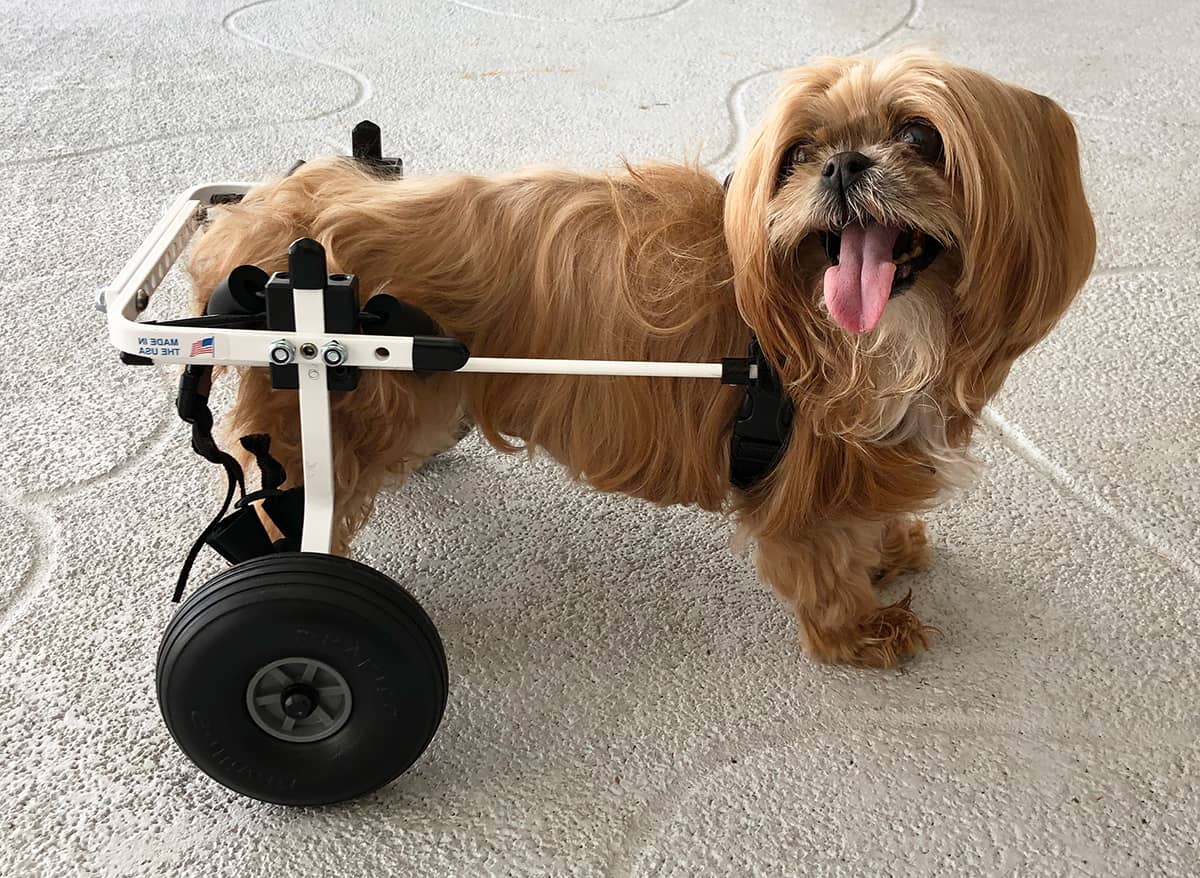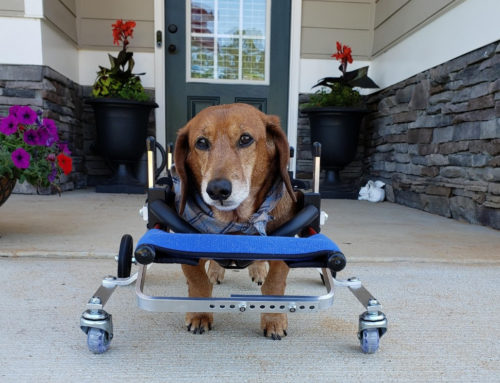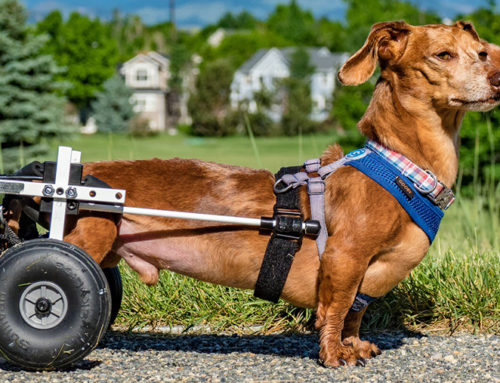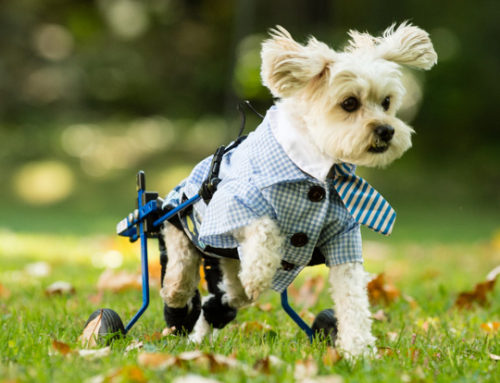Evaluating your pet’s health and desire is an important first step in determining how your pet will handle a K9 Cart’s wheelchair. The overall health and mobility of your pet will also determine what wheelchair design would be most appropriate. We have a basic evaluation area on the website which determines wheelchair design based upon mobility, but this article will go into full detail of how health conditions will effect your pets use of a K9 Cart.
Desire
When fitted with a pet wheelchair most mobility impaired pets, with few exceptions, will walk or run off in their carts. Their tails will be wagging and there will be a new brightness in their eyes.
With an older pet, it is important to think about what your pet wants to do. If they are content to just lay around, and only be taken out for very short periods, you may want to consider our Handheld Harnesses. On the other hand, if they are bright and alert and full of life, despite their mobility problem, a pet wheelchair will provide your pet with an extended, happier, and healthier life.
Overweight Pets
Paralyzed, obese, pets sometimes have a harder time adjusting to a cart. This is usually because of their forced period of inactivity. Dragging themselves along the ground is not considered an indication of front limb strength.
If your pet is able to walk when supported with a handheld harness (keeping the back level), this indicates that your pet will probably be able to handle a cart. Use of a cart will help with weight reduction and take the stress and strain off the back and limbs.
Disposition
It is extremely rare that a pet will fight or refuse to use a K9 Cart. Try the towel test (see above) prior to ordering, to see if your pet will tolerate this type of help. If your pet walks readily with sling support, then they will do well in a cart.
Medical Conditions
Amputees
Rear limb amputees usually get around well on three legs until they start to have problems in the supporting leg, at which time we would recommend a K9 Cart to take stress off of the remaining legs. We have designed a special leg ring support system for pets whose legs have been amputated at the hip. Amputees do very well in carts, however it may take them a bit longer to get used to the cart. Once fitted, we encourage you to send photos of your pet in the cart so we can advise, especially if your pet is having difficulty in the cart.
Arthritis
If your pet is in pain, please call us for advice on the product that will aid you with your pet’s mobility. If the arthritis is controlled with medication, and is in the rear limbs, then our pet wheelchair will aid mobility by taking stress of the hind limbs. If your pet has arthritis in both front and rear limbs, we recommend either our Full Support Wheelchair or our Handheld Harnesses.
Cerebellum Hypoplasia
Usually found in cats, but can also occur in dogs as well. We recommend our Full Support Wheelchair to help keep pets mobile and prevent pets from injuring themselves. The K9 Cart will allow them to have a better quality of life.
Cervical Disc Disease
Usually surgery is indicated to alleviate pain for this condition. A Full Support Wheelchair can be used for the rehabilitation process.
Post surgery – We recommend our Full Support Wheelchair to aid in rehabilitation. It will give full support to your pet, keep it in an upright position, and give you freedom to administer physical therapy. We can add a headrest if it is needed – just request a headrest when placing the order.
No Surgery- We often recommend our Handheld Front and/or Rear Harnesses for support, as pets are usually in intermittent pain with this condition. Please contact us to discuss your pet’s specific needs.
Degenerative myelopathy is the second most common condition for which pets need a cart, and is likened to MS in people. It generally starts off with knuckling of one hind paw, leading to both paws, and a swaying gait in the rear, very often with legs crossing.
There is no pain associated with this condition. Unfortunately, it travels up the spinal cord and affects the front legs over time. To delay this process, we recommend placing your pet in our Rear Support Wheelchair as soon as you observe mobility impairment in the rear of your pet. This will take stress and strain off both the rear and front legs and keep your pet active and happy. Your pet can still use its rear legs as long as it is able. Our Handheld Rear Harness is also useful for helping pets in and out of cars and up stairs.
Once your pet begins to weaken in the front legs, you can order the parts needed to easily convert the Rear Support Wheelchair into a Full Support Wheelchair.
Elbow Dysplasia
There are a number of ways elbow dysplasia can be treated depending on the severity of the condition. To reduce stress on joints, we recommend one of our Dog Wheelchairs (typically a Full Support Wheelchair) or Walkabout Harnesses.
Embolism
Many pets recover from embolisms, or spinal blood clots, within about 4-6 weeks. However, nursing care will be easier with our pet wheelchair and it will promote the health and happiness of your pet, making this an easier time for all. A cart will stabilize the spine and aid in faster recovery, while keeping your pet upright and allow them to eliminate in a standing position.
Fractured Backs
Provided the fracture has been stabilized, and depending on where the spine is fractured, we can advise and recommend the correct product. Please contact us with more details about your pet’s condition so we can better assist you.
Surgery- Our pet mobility chair aids in helping to maintain spinal stability as it keeps the spine and limbs in alignment. This allows for recovery and takes the stress and strain off your pet.
No Surgery- If surgery is not indicated, using our pet mobility chair will prevent sores and infections. It also keeps your pet in an upright position, allowing it to run around normally. Nursing Care will also be easier for the owner and the pet will be healthier and happier.
Fractured Limbs
The need for a cart will depend on the fracture site, what stability has been applied, and the pet’s overall physical condition. Please call or contact us for advice.








Leave A Comment